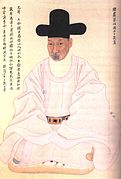Chae Je-gong 채제공 | |
|---|---|
 Portrait of Chae Jegong who served as Yeonguijeong during the reign of
King Jeongjo. | |
| Left State Councillor | |
| In office 25 January 1796 – 14 July 1798 | |
| Preceded by | Yu Yeon-ho |
| Succeeded by | Yi Byeong-mo |
| In office 14 November 1789 – 2 July 1793 | |
| Preceded by | Yi Jae-hyeop |
| Succeeded by | Kim Jong-su |
| Right State Councillor | |
| In office 15 February 1795 – 25 January 1796 | |
| Preceded by | Yi Byeong-mo |
| Succeeded by | Yun Si-dong |
| In office 18 March 1788 – 14 November 1789 | |
| Preceded by | Yi Seong-won |
| Succeeded by | Kim Jong-su |
| Chief State Councillor | |
| In office 2 July 1793 – 11 July 1793 | |
| Preceded by | Kim Ik |
| Succeeded by | Hong Nak-seong |
| Personal details | |
| Born | 12 May 1720 Hongju-mok, Chungcheong Province, Joseon |
| Died | 22 February 1799 (aged 78) Hanseong-bu, Joseon |
| Spouse(s) | Lady, of the Dongbok Oh clan Lady, of the Andong Kwon clan Unnamed woman |
| Children | Chae Hong-won (adopted son) Chae Hong-geun (son) Chae Hong-sin (son) |
| Parents |
|
| Korean name | |
| Hangul | 채제공 |
| Hanja | |
| Revised Romanization | Chae Je-gong |
| McCune–Reischauer | Ch'ae Che-kong |
| Art name | |
| Hangul | 번암, 번옹 |
| Hanja | |
| Revised Romanization | Beonam, Beonong |
| McCune–Reischauer | Pŏn'am, Pŏn'ong |
| Courtesy name | |
| Hangul | 백규 |
| Hanja | |
| Revised Romanization | Baekgyu |
| McCune–Reischauer | Paekkyu |
| Posthumous name | |
| Hangul | 문숙 |
| Hanja | |
| Revised Romanization | Munsuk |
| McCune–Reischauer | Munsuk |
Chae Je-gong (12 May 1720 – 22 February 1799 [1]) was a noted scholar, writer, politician of the Joseon period of Korea. Chae was the leader of the Southerners (or Namin faction) during the reign of King Jeongjo. He passed the regional civil examination (향시) at the age of 15, the mungwa exam at age 23 in 1743, and held high government offices throughout his life, the Yeonguijeong position (i.e. Chief State Councilor) among them. [2] He came from the Pyeonggang Chae clan.
Family
- Great-Grandfather
- Chae Si-sang (채시상; 蔡時祥)
- Grandfather
- Chae Seong-yun (채성윤; 蔡成胤; 1659–1733)
- Father
- Chae Eung-il (채응일; 蔡應一; 1686–1765)
- Uncle - Chae Eung-man (채응만; 蔡膺萬)
- Uncle - Chae Eung-jong (채응종; 蔡膺鍾)
- Uncle - Chae Eung-pal (채응팔; 蔡膺八)
- Chae Eung-il (채응일; 蔡應一; 1686–1765)
- Mother
- Lady Yi of the
Yeonan Yi clan (연안 이씨)
- Grandfather - Yi Man-seong (이만성; 李萬成)
- Lady Yi of the
Yeonan Yi clan (연안 이씨)
- Siblings
- Older sister - Lady Chae (채씨)
- Brother-in-law - Sim Ji-yeon (심지연; 沈祉衍)
- Older sister - Lady Chae (채씨)
- Brother-in-law - Yi Tae-un (이태운; 李台運)
- Older sister - Lady Chae (채씨)
- Wive(s) and children
- Lady Oh of the Dongbok Oh clan (동복 오씨) [3] – No issue.
- Lady Kwon of the Andong Kwon clan (안동 권씨)
[4]
- Adoptive son - Chae Hong-won (채홍원, 蔡弘遠; 1762–1832) – his biological father was one of Chae Je-gong's relatives, Chae Min-gong (채민공; 蔡敏恭)
- Adoptive daughter-in-law - Lady Yi of the Jeonju Yi clan (전주 이씨) – daughter of Yi Gyeom-hwan (이겸환; 李謙煥); No issue.
- Adoptive daughter-in-law - Lady Jeong of the Dongrae Jeong clan (동래 정씨; 東萊 鄭氏); daughter of Jeong Sik (정식)
- Adoptive grandson - Chae Gwa-yeong (채과영; 蔡果永; 1804–1852)
- Adoptive granddaughter-in-law - Lady Yi of the Gyeongju Yi clan (경주 이씨; 慶州 李氏); daughter of Yi Ga (이가; 李榎)
- Adoptive granddaughter-in-law - Lady Yi of the Hansan Yi clan (한산 이씨; 韓山 李氏); daughter of Yi Jae-seong (이재성; 李載聲)
- Great-grandson - Chae Dong-sul (채동술; 蔡東述; 1841–1881)
- Great-granddaughter-in-law - Lady Hong of the Pungsan Hong clan (풍산 홍씨; 豊山 洪氏); daughter of Hong Seung-wi (홍승위; 洪承褘)
- Great-grandson - Chae Dong-sul (채동술; 蔡東述; 1841–1881)
- Adoptive grandson - Chae Gwa-yeong (채과영; 蔡果永; 1804–1852)
- Adoptive son - Chae Hong-won (채홍원, 蔡弘遠; 1762–1832) – his biological father was one of Chae Je-gong's relatives, Chae Min-gong (채민공; 蔡敏恭)
- Unnamed concubine
- Son - Chae Hong-geun (채홍근; 蔡弘謹)
- Daughter-in-law - Lady Jeong of the Naju Jeong clan (나주 정씨; 羅州 丁氏) [5]
- Son - Chae Hong-sin (채홍신; 蔡弘愼)
- Son - Chae Hong-geun (채홍근; 蔡弘謹)
Gallery
In popular culture
- Portrayed by Park Woong in the 2007 CGV TV series Eight Days, Assassination Attempts against King Jeongjo.
- Portrayed by Han In-soo in the 2007-2008 MBC TV series Lee San, Wind of the Palace.
- Portrayed by Kim Ik-tae in the 2010 KBS2 TV series Sungkyunkwan Scandal
References
- ^ In the Korean calendar (lunar), he was born on 6 April 1720 and died on 18 January 1799.
- ^ Jae-eun Kang 2006, p. 387.
- ^ Daughter of Oh Pil-woon (오필운; 吳弼運)
- ^ Daughter of Kwon Sang-won (권상원; 權尙元)
- ^ illegitimate daughter of Jeong Yak-yong's father, Jeong Jae-won (정재원; 丁載遠), so Lady Jeong and Jeong Yak-yong are half-siblings.
Sources
- The National Folk Museum of Korea (2014). Encyclopedia of Korean Folk Literature: Encyclopedia of Korean Folklore and Traditional Culture. Vol. III. 길잡이미디어. ISBN 978-89-289-0084-8.
- Lee E Wha (2006). Korea's Pastimes and Customs: A Social History. Homa & Sekey Books. ISBN 978-1-931907-38-5.
- Jae-eun Kang (2006). The Land of Scholars: Two Thousand Years of Korean Confucianism. Homa & Sekey Books. ISBN 978-1-931907-37-8.


